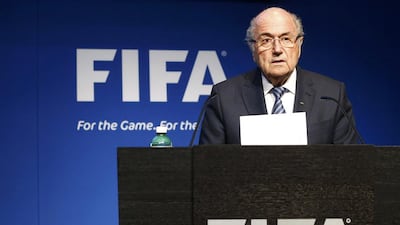Many football-loving people around the world were surprised to hear the White House spokesman weigh in on the corruption scandal at Fifa, the Switzerland-based world governing body of football. Josh Earnest welcomed the announcement that Fifa president Sepp Blatter was stepping down, calling it “an opportunity for that organisation to try to improve their public image”.
Even though most Americans would be unaware of the existence of Fifa, the Obama administration has a surprisingly big stake in its future. It has charged 14 people, including current and former Fifa executives, with racketeering offences. At a time when American power as the world’s policeman is fading and wars are spreading uncontrollably across the Middle East, it is worth asking why Washington is making a big deal of corruption in a faraway organisation, conducted mainly by non-Americans on non-US soil in connection with (for Americans) a minority sport.
The simple answer is that while Washington cannot enforce its will around the world as it once used to by military force, the reach of the US Department of Justice is long and getting longer. American prosecutors are famed for their ingenuity in stretching US laws to cover the globe. Effectively, whenever a criminal act is carried out anywhere in the world using the US dollar or involving a bank that is based in the US, US prosecutors can go after the accused and, if extradited, try them in a US court.
The FBI has another advantage in being able to use the plea bargain, a notorious anti-mafia weapon. A suspect can be threatened with being locked away for decades unless he or she dish the dirt on accomplices. In this case, Chuck Blazer, an American former Fifa executive committee member, has pleaded guilty to taking bribes to sway the choice of World Cup venues.
The use of the plea bargain, combined with the prospect of heavy fines and career-boosting appearances on TV for the successful prosecutor, are a clear incentive to what could amount to judicial extortion. But not many are complaining about this judicial overreach in Western Europe, where reports of corruption at the heart of Fifa have angered sports fans for many years. Ensconced safely in Zurich, Fifa has been beyond the writ of any judicial power except the US.
The real question is whether it is wise in the long term for Washington to use the dollar as a lever of power. President Vladimir Putin, whose country is to hold the football World Cup in 2018, sees the US judicial assault as aimed at taking this prize away. The US was engaging in “yet another blatant attempt to extend its jurisdiction to other states,” he said.
It has not passed unnoticed among rising powers – notably China and India – that the global financial system, from banking to payment services such as Visa, is close to being an American monopoly. The dollar is the key global currency and is widely used for international deals, both legitimate and corrupt. The drug dealer’s attaché case is typically full of dollars, not euros, despite that currency having the criminal-friendly €500-euro note, worth roughly $560, which would save a lot of weight and space.
The worldwide preference for the dollar gives Washington enormous power not just in fighting graft but crucially when the US Treasury imposes “smart sanctions” on countries such as Iran. Every dollar trade passes through the US, and even if the sanctioned country does not use US banks, it is hard to find a bank willing to be shut out of the dollar trade. But bribes could theoretically be paid in euros. Digital currencies such as bitcoin, which are subject to no national authority, have been touted as a way to escape the US arm lock. But bitcoin’s volatility and openness to hacking have restricted its growth. This week the US showed its determination to crush it by handing down a life sentence to Ross Ulbricht, the creator of the Silk Road online bazaar for drugs and other illegal activities. Ulbricht is said to have earned $18 million in bitcoin.
But this is not the end of the story. US control of the financial system is prompting the world to seek a permanent way to do business outside the grasp of the US Treasury. This means the creation of another global currency. The euro will not be it – its stability is unproven and eurozone countries are susceptible to US pressure.
China has a plan to turn its renminbi into an international currency. It is already the 5th most used for global payments. Washington, however, is still jealously guarding the financial privileges it has enjoyed since 1945.
In 2010, the Washington-based International Monetary Fund, guardian of the world’s financial stability, voted to shift six per cent of voting rights to emerging countries, in part to reflect the rise of China. This has been blocked by the US Congress, prompting China to set up the Shanghai-based Asian Infrastructure Investment Bank. China denies that it is a rival to the IMF’s sister organisation, The World Bank. But it is not surprising that having been shut out of the Washington system, it should be planning to set up its own.
In the longer term, there is no true independence for a country that seeks to challenge US supremacy if it still relies on the dollar. As the Fifa scandal shows, the dollar is a hidden source of power equal to the aircraft carrier. A multiplicity of global currencies would change the world’s power balance – and not just make it possible to pay backhanders without Uncle Sam knowing.
Alan Philps is a commentator on global affairs
On Twitter: @aphilps

